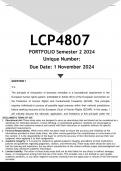LCP4807
PORTFOLIO Semester 2 2024
Unique Number:
Due Date: 1 November 2024
QUESTION 1
1.1.
The principle of exhaustion of domestic remedies is a foundational requirement in the
European human rights system, embedded in Article 35(1) of the European Convention for
the Protection of Human Rights and Fundamental Freedoms (ECHR). This principle
requires individuals to pursue all possible legal avenues within their national jurisdictions
before seeking recourse at the European Court of Human Rights (ECtHR). In this essay, I
will critically discuss the rationale, application, and limitations of this principle under the
DISCLAIMER & TERMS OF USE
1. Educational Aid: These study notes are designed to serve as educational aids and should not be considered as a
substitute for individual research, critical thinking, or professional guidance. Students are encouraged to
conduct their own extensive research and consult with their instructors or academic advisors for specific
assignment requirements.
2. Personal Responsibility: While every effort has been made to ensure the accuracy and reliability of the
information provided in these study notes, the seller cannot guarantee the completeness or correctness of all
the content. It is the responsibility of the buyer to verify the accuracy of the information and use their own
judgment when applying it to their assignments.
3. Academic Integrity: It is crucial for students to uphold academic integrity and adhere to their institution's
policies and guidelines regarding plagiarism, citation, and referencing. These study notes should be used as a
tool for learning and inspiration, but any direct reproduction of the content without proper acknowledgment and
citation may constitute academic misconduct.
4. Limited Liability: The seller of these study notes shall not be held liable for any direct or indirect damages,
losses, or consequences arising from the use of the notes. This includes, but is not limited to, poor grades,
academic penalties, or any other negative outcomes resulting from the application or misuse of the information
provided.
, For additional support +27 81 278 3372
QUESTION 1
1.1.
The principle of exhaustion of domestic remedies is a foundational requirement in
the European human rights system, embedded in Article 35(1) of the European
Convention for the Protection of Human Rights and Fundamental Freedoms (ECHR).
This principle requires individuals to pursue all possible legal avenues within their
national jurisdictions before seeking recourse at the European Court of Human
Rights (ECtHR). In this essay, I will critically discuss the rationale, application, and
limitations of this principle under the European human rights framework, with
particular reference to the ECHR and its jurisprudence.
Rationale for Exhaustion of Domestic Remedies
The principle of exhaustion of domestic remedies is grounded in respect for state
sovereignty and the doctrine of subsidiarity. Subsidiarity underpins the ECHR
framework, asserting that national courts and authorities should have the first
opportunity to address and rectify alleged human rights violations. This approach
allows states to uphold their primary duty of protecting rights, while the ECtHR acts
as a “last resort” body, stepping in only if national remedies prove ineffective or
inaccessible. The exhaustion requirement also alleviates the ECtHR’s caseload by
filtering cases that could be resolved domestically, thereby allowing the Court to
focus its resources on cases requiring international intervention. Additionally, the
principle fosters a dialogue between national and international legal systems,
encouraging the former to develop robust human rights protections.
Application of the Exhaustion Principle under the ECHR
Article 35(1) of the ECHR explicitly states that the ECtHR “may only deal with the
matter after all domestic remedies have been exhausted.” This provision applies
universally to all ECHR member states, but the specific application can vary based
on national legal contexts and the nature of the alleged violation. The ECtHR has
consistently held that applicants must pursue “effective” and “available” remedies,
meaning that the remedies sought must have a reasonable prospect of success and
be accessible without undue hardship or risk of retribution.
, For additional support +27 81 278 3372
The ECtHR’s jurisprudence clarifies that remedies must be adequate and
appropriate to the rights alleged to be violated. In Selmouni v. France (1999), the
Court stated that applicants must exhaust only those remedies that are “capable of
providing redress in respect of their complaints.” Thus, if a remedy is deemed
inadequate—such as a procedure incapable of addressing a specific human rights
violation—the applicant is not required to pursue it. Furthermore, in cases where the
national legal system provides an ineffective or excessively prolonged remedy,
applicants may be exempted from this requirement, as seen in Kudła v. Poland
(2000), where the Court held that excessively lengthy proceedings amounted to a
denial of effective remedies.
Limitations and Critiques of the Exhaustion Requirement
Despite its foundational role, the exhaustion of domestic remedies principle has
faced criticism, especially concerning its rigidity and potential to hinder access to
international justice. Critics argue that the requirement may unjustly burden
applicants who face complex procedural barriers, financial constraints, or fears of
state retaliation. For instance, in cases involving politically sensitive issues or where
the applicant alleges state persecution, pursuing domestic remedies may pose
significant personal risks, and the exhaustion requirement could exacerbate these
challenges.
Moreover, the ECtHR’s reliance on a case-by-case assessment of “effectiveness”
and “availability” introduces subjectivity, as national remedies deemed sufficient in
one jurisdiction may be inadequate in another. In Airey v. Ireland (1979), the Court
acknowledged that practical realities, such as economic and social obstacles, can
prevent applicants from effectively accessing domestic remedies. This precedent
indicates that the exhaustion requirement must be flexible enough to account for
varied national contexts and individual circumstances. However, the balancing act
between flexibility and consistency remains challenging, as the Court must ensure
fairness to both applicants and member states.
Evolution and Exceptions in Jurisprudence
The ECtHR has established exceptions to the exhaustion requirement, broadening
access to international redress for applicants who cannot reasonably obtain justice
domestically. In addition to cases of ineffective or inaccessible remedies, the Court




